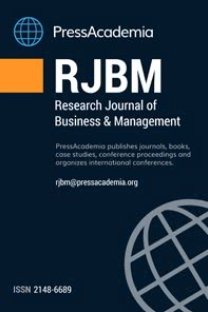A RESEARCH ON THE TECHNOLOGICAL INNOVATION TENDENCIES OF THE STUDENTS OF FIRAT UNIVERSITY
Innovation, technological ınnovation, innovative tendencies creatıve thoughts, technological creativy,
___
- Atasoy, T. (2012). Kendinizin Patronu Olmak: Girişimcilik, METU Pup., Ankara.
- Basalla, G. (2013). Teknolojinin Evrimi, Çev; Cem Soydemir, Doğubatı Yayıncılık, Nisan, Ankara.
- Halac Seçkin, D., Eren, H., Bulut, Ç. (2014), Sosyal Yenilikçilik: Bir Ölçek Geliştirme Çalısması , Hacettepe Üniversitesi İktisadi ve İdari Bilimler Fakültesi Dergisi, Cilt 32, Sayı 1, 2014, s.165-190.
- Kok, C.H. (1996). Testing Hypotheses of Entrepreneurial Characteristics: A Study of Hong Kong MBA Students. Journal of Managerial Psychology, 1996, Vol. 11, Issue 3, pp. 12-25.
- Boru, D. (2006). Girişimcilik Eğilimi – Marmara Üniversitesi İşletme Bölümü Öğrencileri Üzerine Bir Araştırma, Marmara Üniversitesi Yayın No: 733, Sosyal Bilimler Enstitüsü Yayın No: 21, İstanbul.
- Copuroglu, Y. C. (2003). İnsan, Çevre, Kültür Etkileşimi Çerçevesinde, Yukarı Fırat Havzasında Halk Hekimliği , İstanbul Ü., İktisat Fakültesi, Sosyoloji Konferansları, Yirmiyedinci Kitap.
- Eren, H. (2010). Üniversite Öğrencilerinin Sosyal Yenilikçilik Kapasitelerinin Teknolojik Yenilikçilik Eğilimlerine Etkisini Ölçmeye Yönelik Bir Model Önerisi, KHO. Savunma Bilimleri Enstitüsü Teknoloji Yönetimi Ana Bilim Dalı Doktora Tezi, Ankara.
- Gümüşoğlu, Ş., Karaöz, B. (2013). Tarihsel Süreçte Girişimcilik: Muğla Örneği, Uluslararası Girişimcilik ve Kariyer Sempozyumu Bildiriler Kitabı, 63-83.
- Gunay, G. Y. (2016). Turizm Bölümü Öğrencilerinin Girişimcilik Eğilimlerini Etkileyen Demografik Faktörler : İki Devlet Üniversitesi Karşılaştırması, , Business and Economics Research Journal, Volume 7 Number 3, pp. 155-170, ISSN: 1309-2448, DOI Number: 10.20409/berj.2016321814.
- Janiūnaitė, B. and others (2004). Manifestation of Citizens’ Innovative Culture Features in the Context of Learning Cities Development. Social Sciences (1392-0758) , Vol. 46 Issue 4, p18-32, 15p. Publisher: Kaunas University of Technology.
- Magee, B. (1993). Karl Popper'in Bilim Felsefesi ve Siyaset Kuramı, İstanbul, Remzi Kitabevi.
- Porter, M. E. (1992). The Competitive Advantage of Nations, The Macmillan Press Ltd.Hong Kong.
- Soylu, Ali, and others (2012). A Research on Determinig The Effects of Entrepreneurship Tendencies of The Students Gettıng The Entrepreneurship Education: Sample of Honaz Vocational School at Pamukkale University, Journal of Economics & Administrative Sciences / Afyon Kocatepe Üniversitesi Iktisadi ve Idari Bilimler Fakültesi Dergisi. Dec2012, Vol. 14 Issue 2, p209-226.
- Yayın Aralığı: Yılda 4 Sayı
- Başlangıç: 2014
- Yayıncı: PressAcademia
Yeter Demir Uslu, Yasemin Hancioglu
Yueh-yuan LAİ, Chiu-chi WEİ, , Chiou-shuei WEİ
Mustafa YURTTADUR, Ebru CELİKTAS
Maklon Felipus KİLLA, Norlina R. J. KALUNGA, Umbu Ho ARA
İsmail BAKAN, Zumrut Hatice SEKKELİ
Yusuf Cemalettin COPUROGLU, Ozge OZTURK
Jaumin AJDARİ, Ahmed ABDULLAİ, Xhemal ZENUNİ, Bujar RAUFİ, Florie ISMAİLİ
